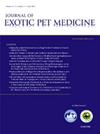Utilization of apitherapy in a liposarcoma in a guinea pig
IF 0.6
4区 农林科学
Q4 VETERINARY SCIENCES
引用次数: 0
Abstract
Background
The use of bee products such as bee venom and IV honey solution is an under-documented avenue of adjunctive therapy when treating neoplasms.
Case description
A 2-year-old female guinea pig presented with a recurrent submandibular liposarcoma. Administration of bee venom was utilized to prolong reoccurrence, and no growth was seen in the first 141 days. The mass eventually did recrudesce, and bee venom along with IV honey were employed over the following 120 days, where the tumor again eventually regressed in size. Within the next 100 days, the tumor regrew and apitherapy was once again initiated, where the mass fluctuated in size. The guinea pig eventually succumbed to secondary cardiopulmonary distress and was euthanized.
Conclusions and case relevance
Administration of bee venom at the site of the mass correlated with regression in tumor size on several occasions. The relevance of adjuvant apitherapy for its antineoplastic effects should be considered and further study is warranted due to its potential to impact treating otherwise challenging neoplastic disease.
蜜蜂疗法在豚鼠脂肪肉瘤中的应用
使用蜂产品,如蜂毒和IV蜂蜜溶液是辅助治疗肿瘤的文献不足的途径。病例描述:一名2岁的雌性豚鼠表现为复发性下颌脂肪肉瘤。使用蜂毒延长复发时间,前141天未见生长。肿块最终确实复发了,在接下来的120天里,蜂毒和静脉注射蜂蜜一起使用,肿瘤最终又缩小了。在接下来的100天内,肿瘤重新生长,再次开始蜂疗,肿块大小波动。这只豚鼠最终死于继发性心肺窘迫,并被安乐死。结论与病例相关性:在肿块部位使用蜂毒与肿瘤大小的缩小有一定的相关性。辅助蜂疗的抗肿瘤作用的相关性应该被考虑和进一步的研究是必要的,因为它有可能影响治疗其他具有挑战性的肿瘤疾病。
本文章由计算机程序翻译,如有差异,请以英文原文为准。
求助全文
约1分钟内获得全文
求助全文
来源期刊

Journal of Exotic Pet Medicine
农林科学-兽医学
CiteScore
1.20
自引率
0.00%
发文量
65
审稿时长
60 days
期刊介绍:
The Journal of Exotic Pet Medicine provides clinicians with a convenient, comprehensive, "must have" resource to enhance and elevate their expertise with exotic pet medicine. Each issue contains wide ranging peer-reviewed articles that cover many of the current and novel topics important to clinicians caring for exotic pets. Diagnostic challenges, consensus articles and selected review articles are also included to help keep veterinarians up to date on issues affecting their practice. In addition, the Journal of Exotic Pet Medicine serves as the official publication of both the Association of Exotic Mammal Veterinarians (AEMV) and the European Association of Avian Veterinarians (EAAV). The Journal of Exotic Pet Medicine is the most complete resource for practitioners who treat exotic pets.
 求助内容:
求助内容: 应助结果提醒方式:
应助结果提醒方式:


